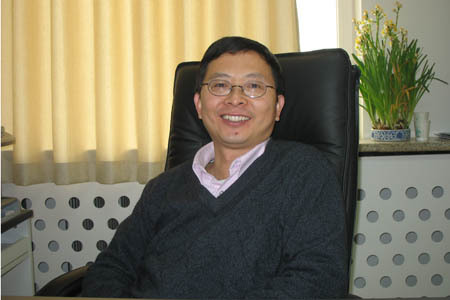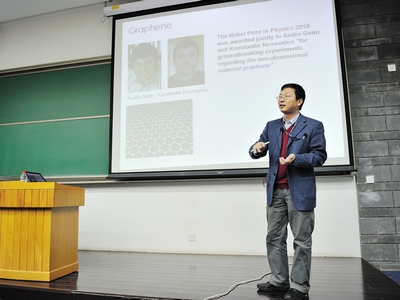Peking University, May 13, 2013: “From nothing to something,” the magnificence of chemistry in the eyes of Professor Gao Song also mirrors his life.
The scholar with the PKU College of Chemistry and Molecular Engineering (CCME) starts from “nothing,” goes through trials and hardship, and devotes his life to scientific research and teaching.
Gao is the youngest PKU member of the Chinese Academy of Sciences (CAS), the highest honor for Chinese scientists.

Professor Gao Song (File photo)
Parental influence
Born in a small county in east China’s Anhui province, Gao was not from a notable family. However, he had access to a decent education from his parents who were both respectable teachers. In the late 1970s, when people rushed into the cities in the wave of economic reform, Gao’s father moved from the county to the countryside to help launch a middle school.
Affected by his father’s role model, the young Gao was determined to pursue what is beneficial for the society and to strive for his own dream. It was also at that time when the seed of becoming a teacher was sowed in his mind by his closely experiencing the valuable work of his father.
Chemistry: central science, pivot of life
"Chemistry is the central science among all natural sciences, although its carriers, the chemists, are simply too humble so that their achievements are frequently misunderstood, distorted, or even neglected," wrote the then CCME Dean Gao in a 2010 editorial of Chemistry — An Asian Journal.
"In fact, chemistry distinguishes itself from all other sciences in that it is the only science that can create new substances without which no properties can be explored, let alone their applications in various aspects of our society," read the co-authored article "The 100th Anniversary of Chemical Research and Education at Peking University."
Gao’s interest in chemistry has been sparked since his junior high school years. In his application for college entrance, chemistry was the only major he chose.
With his talent and passions, the 17-year-old was enrolled in the Chemistry Department of Peking University, a leading chemistry division since 1910, having the longest history among modern Chinese chemistry institutions.
Just as every young man who is exposed to a totally new world with multiple choices, Gao reached a crossroads to the choosing of his future. At PKU, he asked himself again and again, “What should be the ‘pivot’ of my future life?” In the process of learning and practice, Gao gradually found his “pivot” - the world consists of molecules.
An academician immersed in chemistry experiments
With a strong determination to chemistry research, Gao obtained his PhD and became a lecturer at PKU where he has stayed for the following decades, with research leaves of one and a half year in Germany and half a year in Hong Kong.
After years of exploration, the seasoned Chemist Gao focused his research on molecular magnetism. Generally speaking, it designates the use of molecular techniques to obtain new classes of magnetic materials.
Just as many outstanding scientists, Gao is never considered a talkative person. However, when the topic comes to chemistry, there is always a fire inspired in Professor Gao’s eyes. “I can get much fun in an experiment, especially when an unexpected phenomenon or a new result is observed,” he said.
Though it sounds exciting in Gao’s description, molecular magnetism is a steep mountain to climb, calling for hard work, persistence, and total devotion. In this regard, Professor Gao once told a story about his research:
Some phenomena could only be observed under the condition of extremely low temperature, thus a lot of liquid helium was needed to keep that low. However, liquid helium was so expensive that Gao employed a method of recycling the liquid gas. The method saved the lab half of the expenditure, but could cause great danger especially when unwatched. In the end, staff in the lab decided to stay beside the equipment to observe and record the data day by night. So there was always a camp bed in the lab for the persons taking over the shift. It became the symbol of the devotion for the experiments of Professor Gao and his team, enabling milestone breakthroughs.
“‘Chemistry experiment is like a code case. You can only get to the optimal result by testing from 0001 to 1000. It is a long-term job that might kill all your patience.’ But Gao still enjoys it very much. Chemistry to him is what the south pole is to the north pole,” read a China Youth feature story titled “Gao Song: Young academician's ‘magnetic field' of life.”
“If you are really fascinated, you would realize, and be sure, that you want to be a scientist.” That’s a quote from a book named “Who wants to be a scientist.” Gao usually cites it as a saying to encourage his students and to inspire himself.
With years of hard work, Gao’s research achievements brought him awards and titles such as fellow of Royal Society of Chemistry (FRSC) and CAS membership, among others. But for Gao, what only matters is that he is a scientist who devotes himself to a study that he loves.

Professor Gao at lecture (File photo)
“Wonderful boss” for students
Non-academic titles, such as dean of the CCME (2006-2010), is “provisional” and means more of responsibility and serving others, Gao believed. The professor always emphasizes that he is just a teacher who cares most about his students.
In students’ eyes, Gao is a “wonderful boss” - “chaozan laoban” in their words - who not only inspires students in their academic pursuit, but also cares about the growth of those young academics.
“As a graduated, grown-up person, you should take more care of your parents. Whether in further studies or at work, you need to keep a peaceful mind. Remember, we are just normal people.”
Those were the words Gao wrote for the Class of 1996 at the commencement. “Wish you could often pay visits to our department in the future; wish you could donate to our department, whenever available,” Gao added.
With his personal charisma, students see him as a role model, just like how Gao has seen his father.
A great mind from nothing to something
The CCME compound on the east side of the campus does not try to compete in pretentiousness with the grand skyscrapers in Zhongguancun. Great progresses in science and technology started their first step from these ordinary buildings where scientists like Gao have been working hard.
Gao's life is also a process from nothing to something. His pursuit of life inspired by his father, his exploring for future career in college years, his passion for chemistry, and his fervor for teaching and love for students: all of those molecules of life compound make a common person into a “great common person.”
“From nothing to something,” that is the magnificence of chemistry and of life.
“We wish CCME-PKU every success in the future by citing a gorgeous encouragement poem,” Gao wrote in the 2010 editorial. The poem “On the Stork Tower” was written by Tang Dynasty poet Wang Zhihuan (668-742):
The sun beyond the mountain glows;
The Yellow River seawards flows.
You can enjoy a grander sight
By climbing to a greater height.
Written by: Wu Cuiting
Edited by: Zhu Wenjia